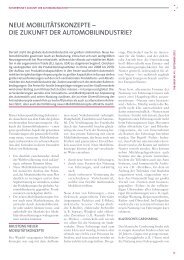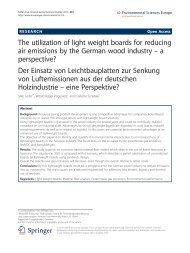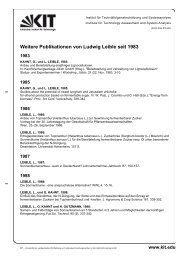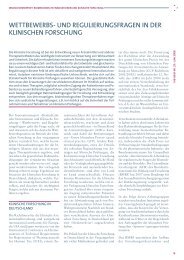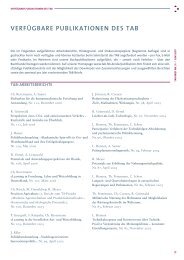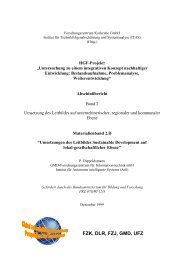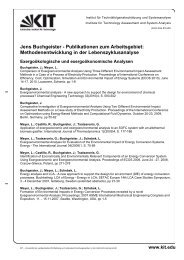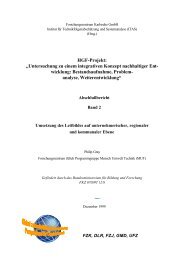Results: RFID and Identity Management in everyday life - ITAS
Results: RFID and Identity Management in everyday life - ITAS
Results: RFID and Identity Management in everyday life - ITAS
Create successful ePaper yourself
Turn your PDF publications into a flip-book with our unique Google optimized e-Paper software.
sensitive l<strong>in</strong>k <strong>in</strong> the cha<strong>in</strong>: customers <strong>in</strong>tent on tak<strong>in</strong>g their <strong>Identity</strong> <strong>Management</strong> <strong>in</strong>to their own h<strong>and</strong>s.<br />
Early examples come from the US, where CASPIAN addressed the <strong>Identity</strong> <strong>Management</strong> issues<br />
concerned with item level tagg<strong>in</strong>g at Wall Mart supermarkets. In Europe the German FoeBud triggered<br />
a controversy on the Metro Future Store when item level tagg<strong>in</strong>g was comb<strong>in</strong>ed with <strong>RFID</strong> customer<br />
loyalty cards.<br />
The Metro Future Store [case #4] is a supermarket of the German Metro Group where new<br />
technologies are tested <strong>in</strong> a real sett<strong>in</strong>g. <strong>RFID</strong> was first of all used <strong>in</strong> supply cha<strong>in</strong> management.<br />
Cartons <strong>and</strong> pallets were tagged <strong>and</strong> readers <strong>in</strong>stalled at the exits <strong>and</strong> entrances of distributions centres<br />
<strong>and</strong> the warehouse. In 2003 the supermarket started experiment<strong>in</strong>g with tagg<strong>in</strong>g groceries <strong>in</strong>dividually.<br />
<strong>RFID</strong> readers <strong>in</strong>corporated <strong>in</strong> shelves <strong>and</strong> connected to the central supply cha<strong>in</strong> management system<br />
could then scan the tags of <strong>in</strong>dividual products. For the supermarket personnel, the ma<strong>in</strong> functions of<br />
item level tagg<strong>in</strong>g are stock-control, check<strong>in</strong>g for misplacement <strong>and</strong> quality control. In order to<br />
prevent the tags from be<strong>in</strong>g read by any third persons once the customer leaves the store, these tags are<br />
supposed to be disabled by a de-activator at the exit of the store.<br />
For the customer, the so called smart shelves also provide product <strong>in</strong>formation triggered by the item<br />
tag. Customers can go to an <strong>in</strong>formation term<strong>in</strong>al to see which data is stored on the chips. An <strong>in</strong>-store<br />
service to view or listen to trailers used tagged video <strong>and</strong> audio products. German law however<br />
dem<strong>and</strong>s this occurs accord<strong>in</strong>g to age limits set by the <strong>in</strong>dustry. The trailers can therefore only be<br />
activated with the <strong>RFID</strong> tag <strong>in</strong> the customer loyalty cards, check<strong>in</strong>g whether the customer has reached<br />
the appropriate age to see or hear the trailer. At that very moment, the identity of the customer <strong>and</strong> the<br />
product were be l<strong>in</strong>ked.<br />
Once the <strong>RFID</strong> system was operational, the Metro Future Store <strong>in</strong>vited customers to test it. About a<br />
year after the open<strong>in</strong>g of the Future Store, FoeBud protested aga<strong>in</strong>st <strong>RFID</strong> <strong>in</strong> the store. Ma<strong>in</strong> issue was<br />
the coupl<strong>in</strong>g of <strong>in</strong>formation about customers’ age on the <strong>RFID</strong> enabled loyalty cards to video <strong>and</strong><br />
audio products, when us<strong>in</strong>g the <strong>in</strong>-store view<strong>in</strong>g service. Accord<strong>in</strong>g to Albrecht von Truchseß, a Metro<br />
spokesman, this was done to meet German law on age restrictions. Still, accord<strong>in</strong>g to the protesters,<br />
Metro did not <strong>in</strong>form its customers their loyalty card conta<strong>in</strong>ed an <strong>RFID</strong> too. Besides the matter on<br />
<strong>RFID</strong> loyalty cards, several other possible applications are be<strong>in</strong>g targeted by privacy advocates. One<br />
was on the possibility of <strong>RFID</strong> enabled shopp<strong>in</strong>g carts to track customer movements. Also, the <strong>RFID</strong><br />
tags should have been de-activated at the exit of the store, but the device malfunctioned on several<br />
occasions, leav<strong>in</strong>g the tag open for <strong>in</strong>trusion outside the store.<br />
In our correspondence with Metro, all these fact were refuted. Daniel Kitscha of the Corporate<br />
Communication department claimed customers were <strong>in</strong>formed about the presence of <strong>RFID</strong> <strong>in</strong> their<br />
card orally <strong>and</strong> by a brochure. Also, only customers of age 16 <strong>and</strong> up could receive the card, which<br />
automatically puts up the age barrier for preview<strong>in</strong>g movies. Further, the tagged shopp<strong>in</strong>g cart was<br />
also a fable: there was only one prototype cart with an <strong>RFID</strong> reader to scan for groceries, which was<br />
never actually used. F<strong>in</strong>ally, he claims there was no negative public response towards <strong>RFID</strong>, not <strong>in</strong><br />
their surveys <strong>and</strong> not on their customer hotl<strong>in</strong>es.<br />
Nevertheless, due to this controversy, the Future Store was forced to recall the loyalty cards <strong>and</strong><br />
restore barcode systems. Some h<strong>and</strong>books on <strong>RFID</strong> (e.g. Garf<strong>in</strong>kel, S. & Rosenberg, B. 2006 or Van<br />
Trier & Rietdijk 2005) as well as many policy documents still mention Metro as one of the examples<br />
<strong>in</strong> which <strong>Identity</strong> <strong>Management</strong> went totally wrong. This is an image hard to counter by any good<br />
<strong>in</strong>tentions of the supermarket. For now, Metro rema<strong>in</strong>s determ<strong>in</strong>ed to keep <strong>RFID</strong> technology <strong>in</strong> the<br />
supply cha<strong>in</strong>. Mr Van Truchseß said. "A top priority is the use of this technology for track<strong>in</strong>g pallets<br />
<strong>and</strong> cases. And although we're still <strong>in</strong>terested <strong>in</strong> test<strong>in</strong>g the technology at the item level, this isn't a<br />
priority at the present." We saw this precautious behaviour with two other retailers too. They did<br />
implement item level tagg<strong>in</strong>g <strong>and</strong> took careful notice of the controversial aspect of connect<strong>in</strong>g item<br />
level tags to customer identity.<br />
19



